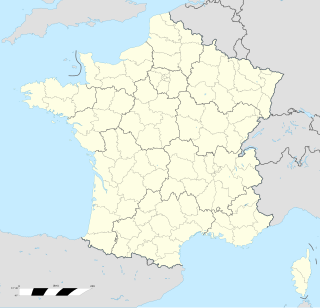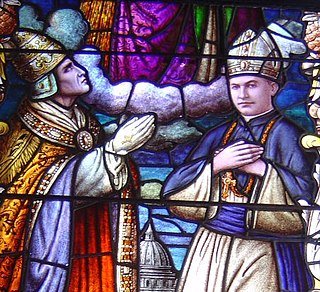
Antonio Agliardi was an Italian Roman Catholic Cardinal, archbishop, and papal diplomat.

Pope Alexander VIII, born Pietro Vito Ottoboni, was Pope from 6 October 1689 to his death in 1691. He is the last pope to take the pontifical name of "Alexander" upon his election to the papacy.

The Patriarch of Alexandria is the archbishop of Alexandria, Egypt. Historically, this office has included the designation "pope".

A ukase, or ukaz, in Imperial Russia, was a proclamation of the tsar, government, or a religious leader (patriarch) that had the force of law. "Edict" and "decree" are adequate translations using the terminology and concepts of Roman law.
Bombazine, or bombasine, is a fabric originally made of silk or silk and wool, and now also made of cotton and wool or of wool alone. Quality bombazine is made with a silk warp and a worsted weft. It is twilled or corded and used for dress-material. Black bombazine was once used largely for mourning wear, but the material had gone out of fashion by the beginning of the 20th century.
Alexandre Frédéric Febvre was a French actor.

A proclamation is an official declaration issued by a person of authority to make certain announcements known. Proclamations are currently used within the governing framework of some nations and are usually issued in the name of the head of state.

A bartizan, also called a guerite or échauguette, or spelled bartisan, is an overhanging, wall-mounted turret projecting from the walls of late medieval and early-modern fortifications from the early 14th century up to the 18th century. Most frequently found at corners, they protected a warder and enabled him to see his surroundings. Bartizans generally are furnished with oillets or arrow slits. The turret was usually supported by stepped masonry corbels and could be round, polygonal or square.

Via Nomentana is an ancient road of Italy, leading North-East from Rome to Nomentum, a distance of 23 km (14 mi). It originally bore the name "Via Ficulensis", from the old Latin village of Ficulea, about 13 km (8.1 mi) from Rome. It was subsequently extended to Nomentum, but never became an important high road, and merged in the Via Salaria a few kilometers beyond Nomentum. It is followed as far as Nomentum by the modern state road, but some traces of its pavement still exist.
In law, allocatur refers to the allowance of a writ or other pleading. It may also designate a certificate given by a taxing master, at the termination of an action, for the allowance of costs.
A dorsiventral organ is one that has two surfaces differing from each other in appearance and structure, as an ordinary leaf. This term has also been used as a synonym for dorsoventral organs, those that extend from a dorsal to a ventral surface. This word is also used to define body structure of an organism, e.g. Platyhelminthes have dorsiventrally flattened body.
A pastoral letter, often called simply a pastoral, is an open letter addressed by a bishop to the clergy or laity of a diocese or to both, containing general admonition, instruction or consolation, or directions for behaviour in particular circumstances. In the Catholic Church, such letters are also sent out regularly at particular ecclesiastical seasons, particularly at the beginning of fasts. In most episcopal church bodies, clerics are often required to read out pastoral letters of superior bishops to their congregations.
His (Royal) Apostolic Majesty was a styled title used by the Kings of Hungary, in the sense of being latter-day apostles of Christianity.

Usellus is a town, comune (municipality) and former bishopric in the Province of Oristano in the Italian region Sardinia.
The Labour Church was an organization intended to give expression to the religion of the labour movement. It had a Christian Socialist outlook.
Giuseppe d' Annibale was a cardinal and theologian.

Arsure-Arsurette is a commune in the Jura department in the region of Bourgogne-Franche-Comté in eastern France.

Charles Erskine was an Italian-Scottish papal diplomat and cardinal.
Academic skepticism refers to the skeptical period of ancient Platonism dating from around 266 BC, when Arcesilaus became head of the Platonic Academy, until around 90 BC, when Antiochus of Ascalon rejected skepticism, although individual philosophers, such as Favorinus and his teacher Plutarch continued to defend Academic skepticism after this date. Unlike the existing school of skepticism, the Pyrrhonists, they maintained that knowledge of things is impossible. Ideas or notions are never true; nevertheless, there are degrees of probability, and hence degrees of belief, which allow one to act. The school was characterized by its attacks on the Stoics and on their belief that convincing impressions led to true knowledge. The most important Academic skeptics were Arcesilaus, Carneades, and Philo of Larissa.
In the Roman Catholic Church, a papal allocution is a solemn form of address or speech from the throne employed by the Pope on certain occasions. It is delivered only in a secret consistory at which the cardinals alone are present.












